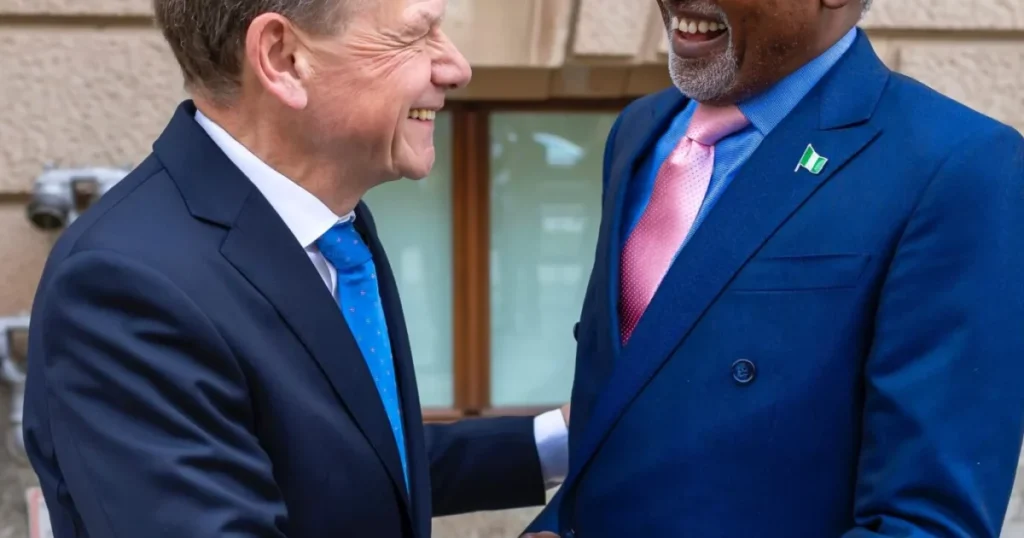Nigeria and Germany are forging stronger economic and energy ties, as exemplified by the recent meeting between Nigerian Foreign Minister Yusuf Tuggar and his German counterpart, Johann Wadephul, in Berlin. This renewed focus on bilateral relations comes at a crucial time for both nations. Germany seeks to diversify its energy sources and secure access to critical raw materials, while Nigeria aims to attract foreign investment and bolster its economic development. Tuggar, a former ambassador to Germany, emphasized the importance of intensifying trade, particularly in areas like critical raw materials and proposed a strengthened cooperative framework for labor migration, potentially addressing skilled labor shortages in both countries. This renewed engagement builds upon existing trade relations, with Nigeria holding the position of Germany’s second largest trading partner in sub-Saharan Africa.
The discussions between the two ministers centered around several key areas for potential collaboration. Germany’s interest in securing reliable sources of critical raw materials aligns with Nigeria’s abundant mineral reserves. This presents an opportunity for mutually beneficial partnerships in exploration, extraction, and processing of these resources. Furthermore, the ministers discussed the potential for increased German private sector investment in Nigeria. Wadephul highlighted Volkswagen’s presence in Nigeria as a successful model for future ventures and expressed his commitment to encouraging further German corporate engagement in the Nigerian market. This could lead to significant job creation and technology transfer within Nigeria, fostering economic growth and industrial development.
Cooperation in the energy sector formed another significant component of the ministerial dialogue. Germany has identified energy cooperation as a pivotal element of its bilateral economic strategy with Nigeria. This focus likely stems from Germany’s ongoing energy transition and its pursuit of diversified energy sources. Nigeria, a major oil and gas producer, could play a role in meeting Germany’s energy needs. Moreover, there is potential for collaboration in renewable energy development, leveraging Nigeria’s abundant solar and wind resources to build a more sustainable energy future for both nations. This could involve German expertise and investment in developing Nigeria’s renewable energy infrastructure.
Beyond trade and energy, the ministers also explored opportunities for enhanced cooperation in vocational training. This highlights a recognition of the importance of human capital development in driving economic progress. By collaborating on vocational training programs, Germany and Nigeria can equip their workforces with the skills needed for the industries of the future. This could involve sharing best practices, developing joint training initiatives, and facilitating exchange programs for students and professionals. Such cooperation can contribute to long-term economic growth and address skilled labor shortages in both countries. The shared focus on human capital development underscores a commitment to sustainable and inclusive economic growth.
The meeting between Tuggar and Wadephul signals a renewed commitment to deepening the partnership between Nigeria and Germany. Both nations stand to gain from increased cooperation in trade, energy, and human capital development. By leveraging their respective strengths and resources, Nigeria and Germany can forge a mutually beneficial relationship that promotes economic growth, addresses energy security concerns, and fosters sustainable development. This renewed engagement reflects a growing recognition of the importance of international collaboration in tackling global challenges and building a more prosperous future.
The discussions held during this meeting lay the groundwork for future collaborations and initiatives between Nigeria and Germany. The focus on critical raw materials, energy cooperation, and vocational training suggests a long-term perspective in building a sustainable and mutually beneficial partnership. Further concrete steps and agreements are likely to follow, translating the discussions into tangible projects and investments. This renewed engagement between Nigeria and Germany holds significant promise for both nations and could serve as a model for future partnerships between developed and developing economies. The focus on mutual benefit and shared growth underscores the potential for international cooperation to drive positive change and address pressing global challenges.














